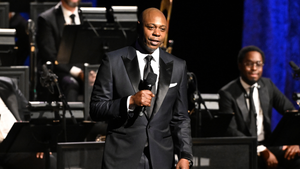December 13 2005 3:17 PM EST
CONTACTAbout UsCAREER OPPORTUNITIESADVERTISE WITH USPRIVACY POLICYPRIVACY PREFERENCESTERMS OF USELEGAL NOTICE
© 2025 Equal Entertainment LLC.
All Rights reserved
All Rights reserved
By continuing to use our site, you agree to our Privacy Policy and Terms of Use.
We need your help
Your support makes The Advocate's original LGBTQ+ reporting possible. Become a member today to help us continue this work.
Your support makes The Advocate's original LGBTQ+ reporting possible. Become a member today to help us continue this work.
If all the ways genes run amok to cause cancer were laid out in a dictionary, scientists would be able to decipher only a small part of the first page.
Hoping to change that, the government is set to begin a $100 million pilot project to unravel the genetic makeup of cancer, with the idea of speeding the discovery of culprits and treatments that today is largely a matter of scientific luck.
It's an audacious project, said Francis Collins, the National Institutes of Health's genetics chief, who announced the formation of the Cancer Genome Project on Tuesday.
It's far more complex than research that mapped the human genome, a molecular blueprint for our species. But the technology does exist to finally track down the genetic changes required to spark any of the 200 diseases we collectively call cancer--knowledge crucial to develop better treatments, Collins said.
"You remember when people were skeptical that we could determine the genome of just one individual," said Collins, who helped direct that project. To map all the genes involved in cancer, "we're talking about basically thousands of Human Genome Projects."
But, "the time is right," he added. "We have the opportunity, because of advances in technology, to really look at the global nature of what is wrong with the cancer cell in a way that frankly we could not have dreamed of even a few years ago."
Scientists have discovered numerous genes that play a role in cancer. Sometimes a single genetic mutation is enough to spark a tumor; sometimes it just makes people more vulnerable to the disease. Other changes mean the difference between a fast-growing killer or a less dangerous tumor, or they determine whether a particular treatment is likely to work.
But developing cancer usually involves about a dozen critical genetic alterations--a domino effect--that differ by malignancy, and scientists have uncovered only a fraction of them, an NIH working group reported earlier this year.
"What makes cancer so hard in terms of really conquering the disease is its complexity," explained Anna Barker of the National Cancer Institute. "There are myriad genetic changes that drive the processes that are cancer, and every one of those can be a little different from one human to another."
A handful of so-called targeted drugs--Herceptin, Gleevec, Iressa, Tarceva--are proving remarkably effective at battling certain cancers in patients with specific faulty genes.
That's only a small portion of patients. But those drugs show that "if you can find pivotal mutations, you can actually change clinical practice," Barker said.
Under the Cancer Genome Project, researchers who now work independently will be able to share data in hopes of speeding such discoveries--not just of specific gene mutations but also of chromosome rearrangements, faulty on/off switches, and other abnormalities.
Funded by the NCI and Collins's National Human Genome Research Institute, the project will begin as a three-year pilot program focusing on two or three still-to-be-chosen cancer types. (AP)
From our Sponsors
Most Popular
Bizarre Epstein files reference to Trump, Putin, and oral sex with ‘Bubba’ draws scrutiny in Congress
November 14 2025 4:08 PM
True
Jeffrey Epstein’s brother says the ‘Bubba’ mentioned in Trump oral sex email is not Bill Clinton
November 16 2025 9:15 AM
True
Watch Now: Pride Today
Latest Stories
All about the infamous CECOT prison — on which CBS's Bari Weiss pulled a story
December 22 2025 7:27 PM
Chest binder vendors respond to 'absurd' FDA warning letter: 'Clearly discrimination'
December 22 2025 3:16 PM
Gay NYC Council member Erik Bottcher drops U.S. House bid, will run for state Senate instead
December 22 2025 2:03 PM
Massachusetts removes rule requiring foster parents to support LGBTQ+ youth
December 22 2025 12:55 PM
Dave Chappelle defends Saudia Arabia set: Trans jokes 'went over very well'
December 22 2025 12:33 PM
Texas judge who refused to officiate same-sex weddings sues to overturn marriage equality
December 22 2025 11:41 AM
At 50, passing isn’t the goal. Living is
December 22 2025 6:00 AM
A heart filled with trans hate is how Marjorie Taylor Greene is choosing to be remembered
December 20 2025 10:00 AM
Love 'Heated Rivalry'? Watch these 9 great queer shows next
December 19 2025 5:50 PM
Trending stories
Recommended Stories for You



































































Charlie Kirk DID say stoning gay people was the 'perfect law' — and these other heinous quotes